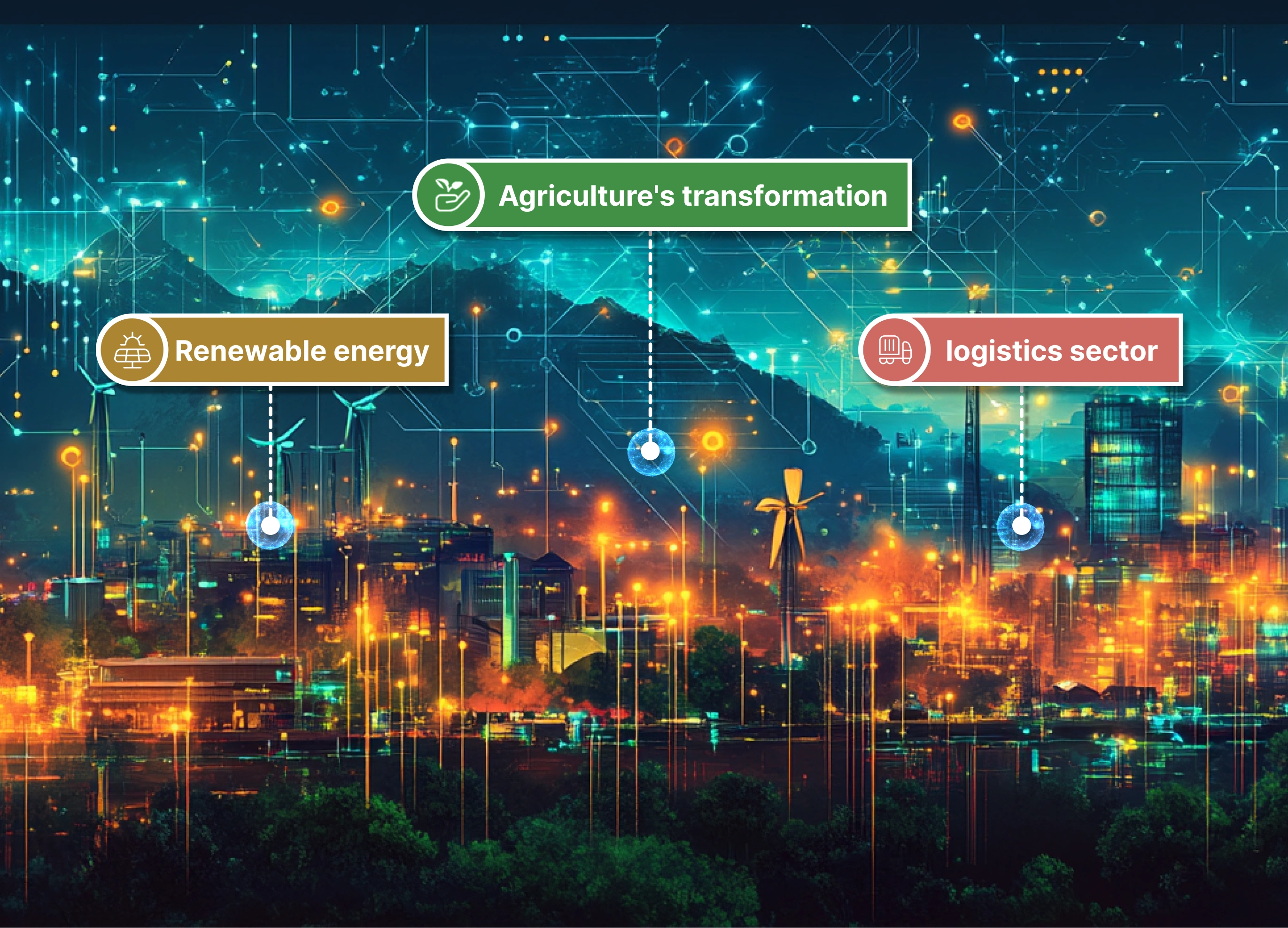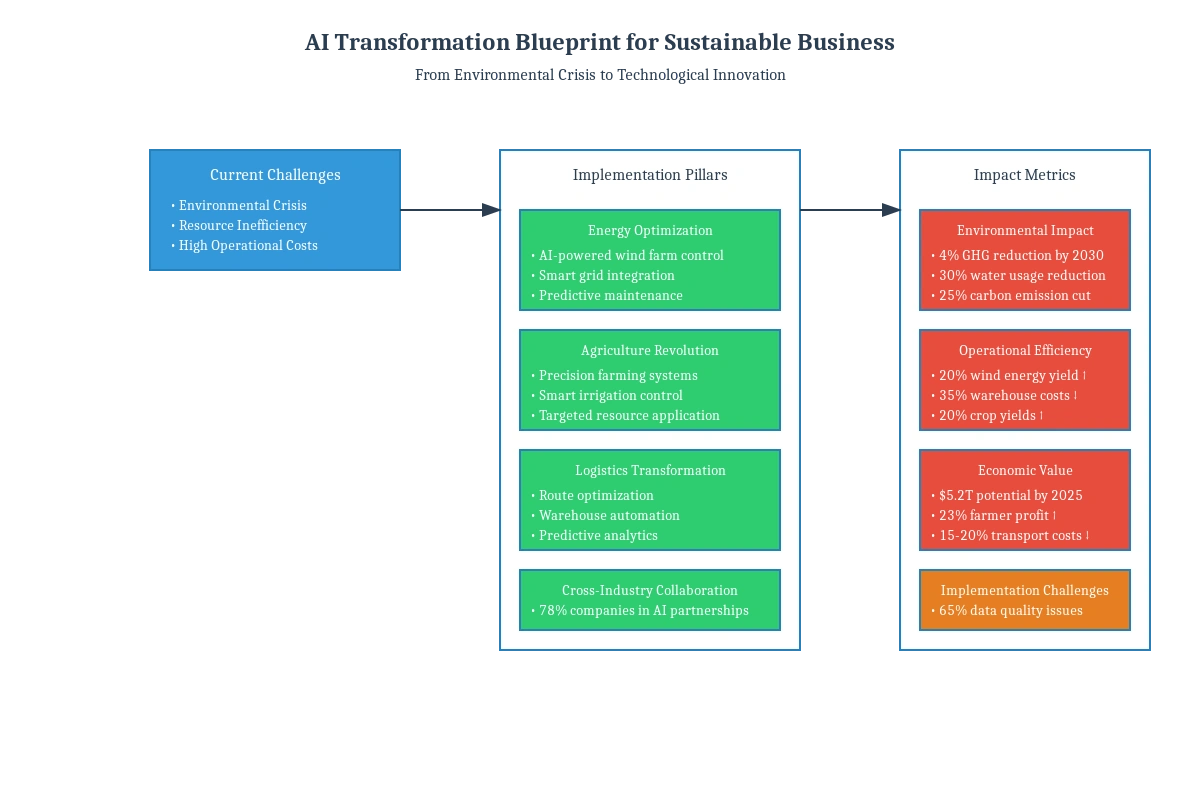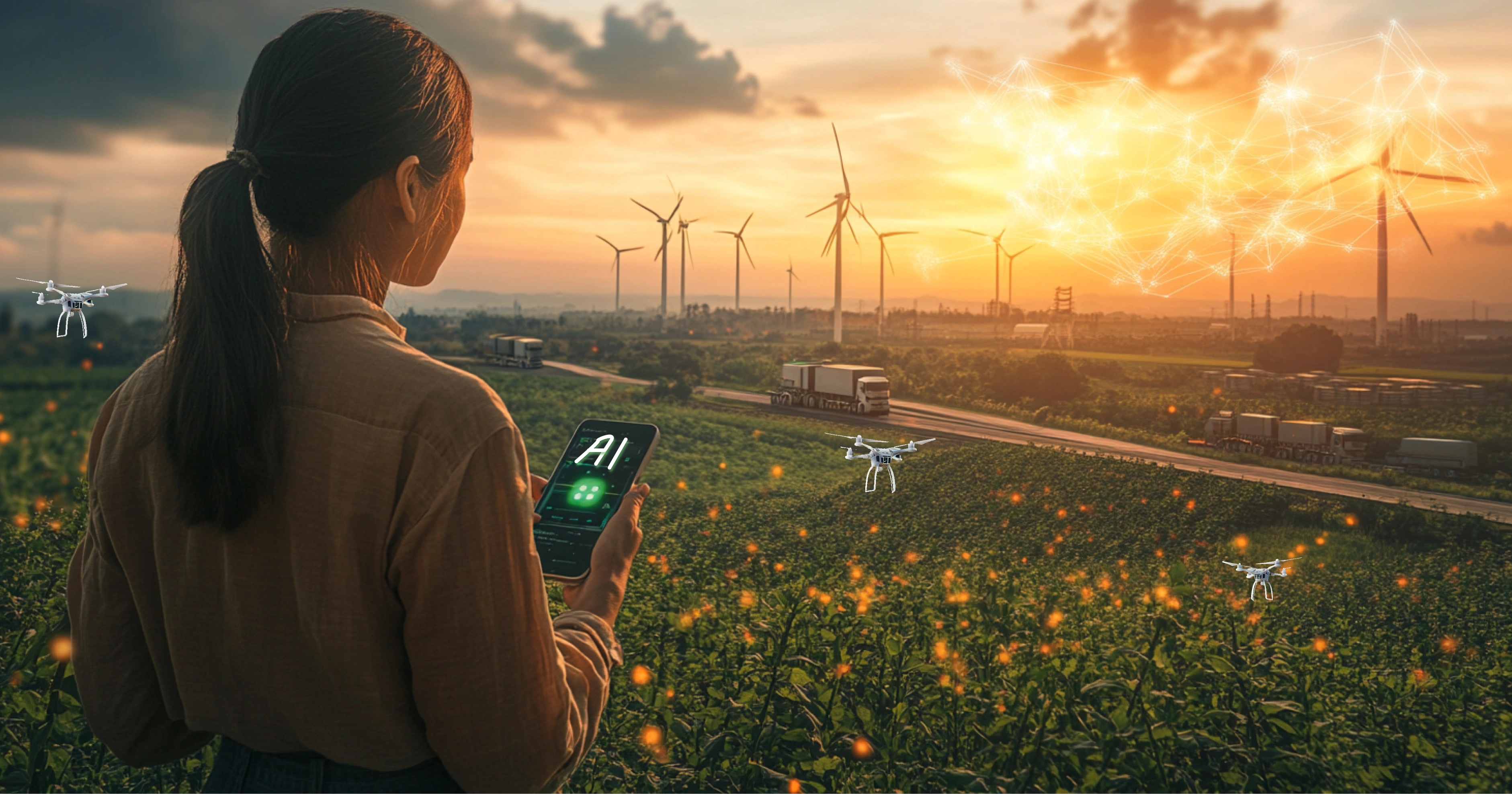A smallholder farmer reviews AI-powered irrigation recommendations on her smartphone, precisely timing water usage to combat draught conditions while preserving groundwater reserves. Autonomous drones swoop across massive offshore wind farms, their infrared sensors detecting microscopic stress fractures in turbine blades weeks before catastrophic failures could occur. Across the Pacific, a fleet of self-driving trucks reduces carbon emissions by 23% through AI-optimized routes that adapt in real-time to traffic patterns, weather conditions, and delivery schedules.
These aren’t concocted scenarios – these are happening right now and it's only the beginning.
The AI Revolution – From Data to Global Solutions
As we stand at the crossroads of rapid technological innovation and environmental crisis, artificial intelligence emerges as our most powerful ally in solving seemingly insurmountable global challenges. According to the World Economic Forum's 2024 AI Impact Report, AI solutions could help reduce global greenhouse gas emissions by up to 4% by 2030 – equivalent to the 2019 annual emissions of Australia, Japan, and Mexico combined.
But how exactly is AI transforming industries to create a more sustainable future?
Powering the Future with AI
In the renewable energy sector, AI is revolutionizing how we harness and distribute clean power. Google's DeepMind project demonstrated a 20% improvement in wind farm energy yield through AI-powered predictions and optimization. Meanwhile, the International Renewable Energy Agency (IRENA) reports that AI-driven smart grids could facilitate a 30% increase in renewable energy integration by 2025.
Agriculture's transformation through AI is equally impressive. According to the Food and Agriculture Organization (FAO), AI-powered precision farming could reduce water usage by up to 30% while increasing crop yields by 20%. The impact is already visible: John Deere's AI-enabled tractors have helped farmers reduce herbicide use by up to 90% through precise, targeted application.
The logistics sector is witnessing perhaps the most dramatic AI-driven evolution. McKinsey's 2024 Supply Chain Report indicates that AI-optimized supply chains can reduce transportation costs by 15-20% while cutting carbon emissions by up to 25%. Companies like Amazon have already reported a 35% reduction in warehouse operating costs through AI-powered robotics and predictive analytics.


Powering the Future with AI
Emerging AI Trends Beyond the Obvious
What makes today's AI revolution unique is its collaborative nature. The MIT Technology Review's 2024 AI Survey reveals that 78% of companies are now engaging in cross-industry AI partnerships – a 45% increase from 2022. This collaborative approach is breeding innovation in unexpected ways:
• Predictive Analytics : Climate modeling accuracy has improved by 40% through AI-powered weather prediction systems (National Oceanic and Atmospheric Administration, 2024)
• Autonomous Systems : DHL's AI-driven logistics optimization has reduced last-mile delivery emissions by 18% (DHL Sustainability Report, 2024)
• Cross-Industry Innovation : The AgriTech-AI Alliance, a partnership of 50+ companies, has helped small farmers increase profit margins by an average of 23% through shared AI resources

The Reality Check – Challenges and Solutions
Despite proven capabilities, this AI revolution comes with its own set of hurdles. A 2024 survey by Deloitte found that 65% of companies struggle with data quality issues when implementing AI solutions. The regulatory landscape is equally challenging, with 72% of organizations citing compliance concerns as a major barrier to AI adoption.
But here's where the story takes an interesting turn.
Rather than viewing these challenges as roadblocks, forward-thinking organizations are using them as catalysts for innovation. Take the example of AgriTech startup CropSage, which turned its data limitation challenge into an opportunity by creating a synthetic data generation platform that now serves 50,000 farmers across three continents.

AI Transformation Blueprint for Sustainable Business
Your Role in the AI Revolution
As we stand on the brink of this technological renaissance, there’s an important question to answer in regard to the transformational effects of AI on industries : How quickly will organizations adapt to remain competitive and contribute to global sustainability goals?
The stakes couldn’t be higher. The World Economic Forum projects that AI-driven sustainability initiatives could create $5.2 trillion in economic value by 2025. Every day spent delaying is an opportunity lost—not just in profitability but in establishing your organization as a market leader. Meanwhile, competitors leveraging AI are gaining significant advantages, from slashing costs to creating innovative customer experiences.
Failure to act now means falling behind in a world where speed, precision, and sustainability are non-negotiable. Companies embracing AI today are already reaping measurable benefits : reducing operational inefficiencies by up to 30%, lowering carbon footprints, and dramatically improving customer satisfaction. For those waiting on the sidelines, the gap only grows harder to bridge.
Whether you're a small agricultural cooperative or a multinational logistics company, the tools exist, the potential is proven, and the roadmap to success is clear. Here’s how you can get started:
- Evaluate Your Needs: Identify the most critical challenges AI can address within your organization—be it supply chain inefficiencies, customer experience gaps, or sustainability goals.
- Collaborate with Experts: Partner with AI consultants who can help tailor solutions to your unique business requirements while ensuring seamless integration and measurable outcomes.
- Start Small but Strategically: Prioritize high-impact, low-risk use cases to build momentum and showcase immediate ROI to stakeholders.
- Invest in Scalability: Create a long-term roadmap that aligns AI initiatives with business objectives, ensuring scalability across departments and processes.
- Measure and Iterate: Regularly evaluate the performance of your AI solutions, refining them as needed to adapt to evolving market conditions.
Don’t let outdated systems or resistance to change hold you back. Begin your AI transformation journey today. Schedule a consultation with our AI experts to explore custom AI solutions that deliver ROI and measurable impact which could position your organization for sustained long-term success.
Smart machines are everywhere, but businesses need smarter decisions, smarter strategies and smarter solutions with AI. Let’s take the first step to create a more sustainable world.


